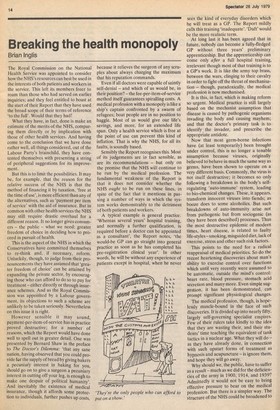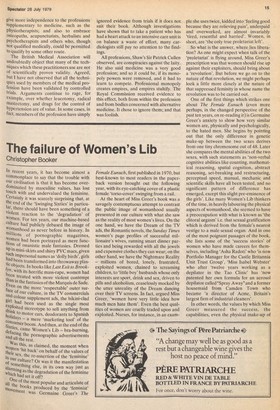Breaking the health monopoly
Brian Inglis
The Royal Commission on the National Health Service was appointed to consider how the NHS's resources can best be used in the interests of both patients and workers in the service. This left its members freer to roam than those who had served on earlier inquiries; and they feel entitled to boast at the start of their Report that they have used the broad scope of their terms of reference `to the full'. Would that they had!
What they have, in fact, done is make an estimate of the merits of the NHS, comparing them directly or by implication with those of other health services. And having come to the conclusion that we have done rather well, all things considered, out of the Labour Party's brainchild, they have contented themselves with presenting a string of peripheral suggestions for its improvement.
But this is to limit the possibilities. It may be, for example, that the reason for the relative success of the NHS is that the method of financing it by taxation, 'free at the time of use', is more efficient than any of the alternatives, such as 'payment per item of service' with the aid of insurance. But in common with other health services the NHS may still require drastic overhaul for a different reason. It no longer gives consumers — the public — what we need: greater freedom of choice in deciding how to proceed in pursuit of health.
This is the aspect of the NHS in which the Conservatives have committed themselves to re-think and, if necessary, reform. Unluckily, though, to judge from their pronouncements they have assumed that 'greater freedom of choice' can be attained by expanding the private sector, by encouraging those who can afford to do so to pay for treatment — either directly or through insurance schemes. And as the Royal Commission was appointed by a Labour government, its objections to such a scheme are unlikely to be taken seriously. Nevertheless on this issue it is right.
However sensible it may sound, payment-per-item-of-service has in practice proved destructive; for a number of reasons, which the Report would have done well to spell out in greater detail. One was presented by Bernard Shaw in the preface to The Doctor's Dilemma: 'that any sane nation, having observed that you could pro vide tar the supply of bread by giving bakers a pecuniafy interest in baking for you, should go on to give a surgeon a pecuniary interest in cutting off your leg, is enough to make one despair of political humanity'. And inevitably the existence of medical insurance, though it affords some protection to individuals, further pushes up costs, because it relieves the surgeon of any scruples about always charging the maximum that his reputation commands.
Even if all doctors were capable of saintly self-denial — and which of us would be, in their position? —the fee-per-item-of-service method itself guarantees spiralling costs. A medical profession with a monopoly is like a ship's captain confronted by a swarm of refugees; boat people are in no position to haggle. Most of us would give our life's savings, and more, for an extended life span. Only a health service which is free at the point of use can prevent this kind of inflation. That is why the NHS, for all its faults, is soundly based.
Sensibly the Report recognises this. Most of its judgements are in fact sensible, as are its recommendations . but only on the premise that the NHS will continue to be run by the medical profession. The fundamental weakness of the Report is that it does not consider whether the NHS ought to be run on these lines, in spite of the fact that it mentions in passing a number of ways in which the system works demonstrably to the detriment of both patients and workers.
A typical example is general practice. 'Whereas several years' hospital training, and normally a further qualification, is required before a doctor can be appointed as a consultant', the Report notes, 'the would-be GP can go straight into general practice as soon as he has completed his pre-registration clinical year'. In other words, he will be without any experience of patients except in hospital, when he never sees the kind of everyday disorders which he will treat as a GP. The Report mildly calls this training 'inadequate'. 'Daft' would be the more realistic term.
At long last it has been agreed that in future, nobody can become .a fully-fledged GP without three years' preliminary apprenticeship. But the apprenticeship can come only after a full hospital training, irrelevant though most of that training is to a GP's work. It is like the army top brass, between the wars, clinging to their cavalry in order to fight off the threat of mechanisation — though, paradoxically, the medical profession is now mechanised.
It is this, in fact, which is making reform so urgent. Medical practice is still largely based on the mechanist assumption that disease is caused by pathogenic organisms invading the body and causing mayhem; and that the doctor's primary task is to identify the invader, and prescribe the appropriate antidote.
Now that most germ-borne infections have (at least temporarily) been brought under control, this is no longer a tenable assumption because viruses, originally believed to behave in much the same way as germs, have been shown to operate on a very different basis. Commonly, the virus is not itself destructive; it becomes so only following a breakdown in the body's selfregulating 'auto-immune' system, leading to bio-chemical changes. These, it appears, transform innocent viruses into fiends; as booze does to some alcoholics. But such breakdowns of auto-immunity arise not from pathogenic but from sociogenic (as they have been described) processes. Thus the most destructive epidemic of modern times, heart disease, is related to faulty life-styles—smoking, misguided diet, lack of exercise, stress and other such risk factors.
This points to the need for a radical reappraisal of medical priorities. So do the recent heartening discoveries about man's ability to exercise control over functions which until very recently were assumed to be automatic, outside the mind's control: heart rate, blood pressure, stomach acid secretion and many more. Even simple suggestion, it has been demonstrated, can prompt significant physiological changes.
The medical profession, though, is hopelessly muscle-bound in the face of such discoveries. It is divided up into nearly fifty, largely self-governing specialist empires. Few of their rulers take kindly to the idea that they are wasting their, and their students' time teaching the equivalent of tank tactics in a nuclear age. What they will do — as they have already done, in connection with such upstart forms of treatment as hypnosis and acupuncture — is ignore them, and hope they will go away. Why should we, the public, have to suffer as a result — much as we did for the deficiencies of the army in 1900, 1914, and 1939? Admittedly it would not be easy to bring effective pressure to bear on the medical profession. But there is a simpler way. The structure of the NHS could be broadened to give more independence to the professions supplementary to medicine, such as the Physiotherapists; and also to embrace osteopaths, acupuncturists, herbalists and Psychotherapists and others who, though not qualified medically, could be permitted to qualify by some other route.
The British Medical Association will undoubtedly object that many of the techniques which these practitioners use are not of scientifically proven validity. Agreed; but I have not observed that all the techniques used by members of the medical profession have been validated by controlled trials. Arguments continue to rage, for example, over whether leucotomy, radical mastectomy, and drugs for the control of hypertension are of value. In some cases, in fact, members of the profession have simply ignored evidence from trials if it does not suit their book. Although investigations have shown that to take a patient who has had a heart attack to an intensive care unit is on balance a waste of effort, many cardiologists still pay no attention to the findings.
All professions, Shaw's Sir Patrick Cullen observed, are conspiracies against the laity. He also said medicine was a very good profession; and so it could be, if its monopoly powers were removed, and it had to learn to compete. Professional monopoly creates empires, and empires stultify. The Royal Commission received evidence to this effect, both from within the profession and from bodies concerned with alternative medicine. It chose to ignore them; and that was foolish.







































 Previous page
Previous page